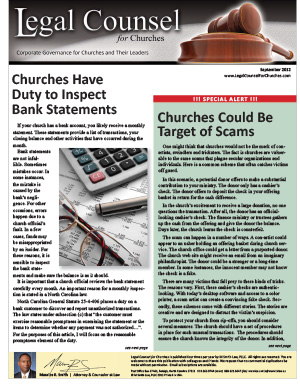One might think that churches would not be the mark of con-artists, swindlers and tricksters. The fact is churches are vulnerable to the same scams that plague secular organizations and individuals. Here is a common scheme that often catches victims off guard.
In this scenario, a potential donor offers to make a substantial contribution to your ministry. The donor only has a cashier’s check. The donor offers to deposit the check in your offering basket in return for the cash difference.
In the church’s excitement to receive a large donation, no one questions the transaction. After all, the donor has an official-looking cashier’s check. The finance ministry or trustees gathers up the cash from the offering and give the donor the balance. Days later, the church learns the check is counterfeit.
The scam can happen in a number of ways. A con-artist could appear to an usher holding an offering basket during church service. The church office could get a letter from a purported donor. The church web site might receive an email from an imaginary philanthropist. The donor could be a stranger or a long-time member. In some instances, the innocent member may not know the check is a fake.
There are many victims that fall prey to these kinds of tricks. The reasons vary. First, these cashier’s checks are authentic-looking. With today’s desktop software and access to a color printer, a scam artist can create a convincing fake check. Secondly, these schemes come with different stories. The stories are creative and are designed to distract the victim’s suspicion.
To protect your church from rip-offs, you should consider several measures. The church should have a set of procedures in place for such unusual transactions. The procedures should ensure the church knows the integrity of the donor. In addition, church officials should have the ability to detect fake documents. If there is doubt about the genuineness of a check, the check could be taken to the church’s financial institution for inspection. Nothing of value should be exchanged with the donor until the church is satisfied that the instrument is legal.
This is one kind of swindle the church could face. The possibilities are endless for the number of ways fraud can be committed. Have your church officials meet with your lawyer, insurance agent or other risk management professionals to build defenses against this and other scams.

